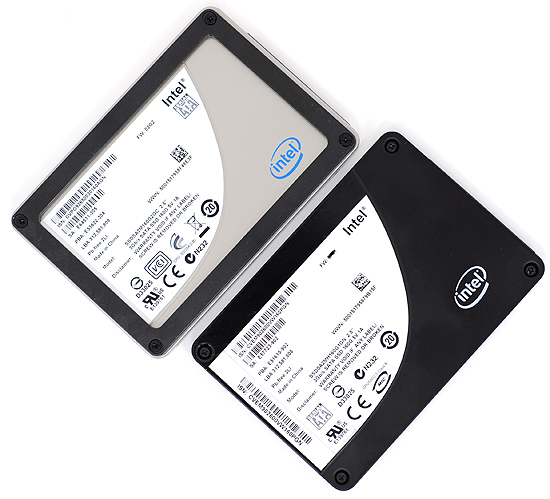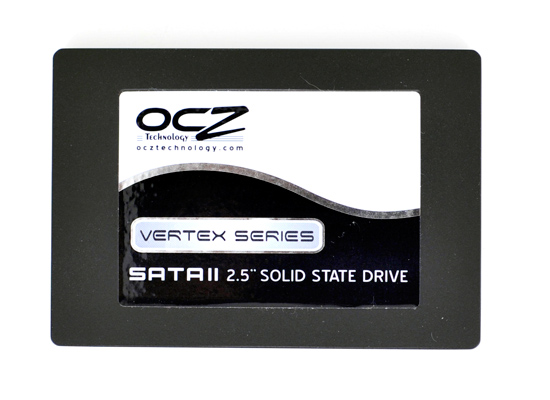The SSD Relapse: Understanding and Choosing the Best SSD
by Anand Lal Shimpi on August 30, 2009 12:00 AM EST- Posted in
- Storage
One Tough Act to Follow
What have I gotten myself into? The SSD Anthology I wrote back in March was read over 2 million times. Microsoft linked it, Wikipedia linked it, my esteemed colleagues in the press linked it, Linus freakin Torvalds linked it.
The Anthology took me six months to piece together; I wrote and re-wrote parts of that article more times than I'd care to admit. And today I'm charged with the task of producing its successor. I can't do it.
The article that started all of this was the Intel X25-M review. Intel gave me gold with that drive; the article wrote itself, the X25-M was awesome, everything else in the market was crap.

Intel's X25-M SSDs: The drives that started a revolution
The Anthology all began with a spark: the SSD performance degradation issue. It took a while to put together, but the concept and the article were handed to me on a silver platter: just use an SSD for a while and you’ll spot the issue. I just had to do the testing and writing.

OCZ's Vertex: The first Indilinx drive I reviewed, the drive that gave us hope there might be another.
But today, as I write this, the words just aren't coming to me. The material is all there, but it just seems so mature and at the same time, so clouded and so done. We've found the undiscovered country, we've left no stone unturned, everyone knows how these things work - now SSD reviews join the rest as a bunch of graphs and analysis, hopefully with witty commentary in between.
It's a daunting, no, deflating task to write what I view as the third part in this trilogy of articles. JMicron is all but gone from the market for now, Indilinx came and improved (a lot) and TRIM is nearly upon us. Plus, we all know how trilogies turn out. Here's hoping that this one doesn't have Ewoks in it.
What Goes Around, Comes Around
No we're not going back to the stuttering crap that shipped for months before Intel released their X25-M last year, but we are going back in the way we have to look at SSD performance.
In my X25-M review the focus was on why the mainstream drives at the time stuttered and why the X25-M didn't. Performance degradation over time didn't matter because all of the SSDs on the market were slow out of the box; and as I later showed, the pre-Intel MLC SSDs didn’t perform worse over time, they sucked all of the time.
Samsung and Indilinx emerged with high performance, non-stuttering alternatives, and then we once again had to thin the herd. Simply not stuttering wasn't enough, a good SSD had to maintain a reasonable amount of performance over the life of the drive.
The falling performance was actually a side effect of the way NAND flash works. You write in pages (4KB) but you can only erase in blocks (128 pages or 512KB); thus SSDs don't erase data when you delete it, only when they run out of space to write internally. When that time comes, you run into a nasty situation called the read-modify-write. Here, even to just write 4KB, the controller must read an entire block (512KB), update the single page, and write the entire block back out. Instead of writing 4KB, the controller has to actually write 512KB - a much slower operation.
I simulated this worst case scenario performance by writing to every single page on the SSDs I tested before running any tests. The performance degradation ranged from negligible to significant:
| PCMark Vantage HDD Score | New | "Used" |
| Corsair P256 (Samsung MLC) | 26607 | 18786 |
| OCZ Vertex Turbo (Indilinx MLC) | 26157 | 25035 |
So that's how I approached today's article. Filling the latest generations of Indilinx, Intel and Samsung drives before testing them. But, my friends, things have changed.
The table below shows the performance of the same drives showcased above, but after running the TRIM instruction (or a close equivalent) against their contents:
| PCMark Vantage HDD Score | New | "Used" | After TRIM/Idle GC | % of New Perf |
| Corsair P256 (Samsung MLC) | 26607 | 18786 | 24317 | 91% |
| OCZ Vertex Turbo (Indilinx MLC) | 26157 | 25035 | 26038 | 99.5% |
Oh boy. I need a new way to test.










295 Comments
View All Comments
Mr Perfect - Tuesday, September 1, 2009 - link
Probably demand. When I saw that price, I shopped around to see what was going on. Answer? Everyone else seems to be out of stock.Naccah - Tuesday, September 1, 2009 - link
I've been waiting to get an SSD till Win 7 released hoping that the prices would have stabilized somewhat by that time. The recent price fluctuation is disturbing as well as the availability of the X25 G2. When the G2 first hit Newegg I was surfing the site and could have grabbed one for $230, but like I said I was content to wait. Now I'm having second thoughts! and wondering if I should grab one if the price goes down again.gfody - Tuesday, September 1, 2009 - link
That doesn't explain the 160gb - it's not even in stock yet. I have been waiting a month for this drive to be in stock and here they more than double the price one day before the ETA date! It's an outrage.. if I'd known the drive was $1000 I would have bought something else.Way to screw your customers Newegg
araczynski - Tuesday, September 1, 2009 - link
A) your intro has the familiar smell of tomshardware, you'd do to be without that, its unbecoming.B) your final words smell of the typical big corp establishment mentality; bigger, faster, more expensive, consumers want! while if the market is any indication, is completely the opposite of the truth. people want 'good enough' for cheap, as the recent Wired magazine article more or less said. granted, Wired isn't the source for indepth technical reading, but it is a good source sometimes of getting the pulse of things...sometimes, still, more often than anything coming out of the mouths of the big corps.
C) everything in between A and B is great though :) Please leave the opinions/spins to the PR machines.
Personally, the cost of these things is still more than i'm willing to pay for, for any speed increase. the idiotic shenanigans of firmwares and features only present after special downloads/phases of the moon make me just blow off the whole technology for a few more years. I'll revisit this in say 2 or 3 years, perhaps the MLC's will finally die off and the SLC's (unless i have the 2 backwards) or something better rolls out with a longer lifespan.
Anand Lal Shimpi - Tuesday, September 1, 2009 - link
A) My intention with the intro was to convey how difficult it was for me to even get to the point where I felt remotely comfortable publishing this article. I don't like posting something that I don't feel is worthy of the readership's reception. My sincere apologies if it came off as arrogant or anything other than an honest expression of how difficult it was to complete. I was simply trying to bring you all behind the scenes and take you into the crazy place that's my mind for a bit :)B) I agree that good enough for cheap is important, hence my Indilinx recommendation at the end. But we can't stifle innovation. We need bigger, better, faster (but not necessarily more expensive, thank you Moore's Law) to keep improving. I remember when the P3 hit 1GHz and everyone said we don't need faster CPUs. If we stopped back then we wouldn't have the apps/web we have today since developers can count on a large install base of very fast processors.
Imagine what happens in another decade when everyone has many-core CPUs in their notebooks...
Take care,
Anand
DynacomDave - Tuesday, September 29, 2009 - link
First - Anand thanks for the good work and the great article.I too have an older laptop that has a PATA interface that I'd like to upgrade with an SSD. I contacted Super Talent about their MasterDrive EX2 - IDE/PATA. Their response was; We only use Indilinx controller for SATA drives, like UltraDrive series. We use Phison controller for EX2/IDE drives.
I want to improve performance not degrade it. I don't know if this will perform like the Indilinx or like the old SSDs. Can anyone help me with this?
bji - Tuesday, September 1, 2009 - link
There are a few more smaller players in the SSD controller game that don't ever show up in these reviews. They are Silicon Motion and Mtron. The reason I am interested in them is because I have a laptop that is PATA only (it's old I know but I love it and I want to extend its life with an SSD), and I am trying to get an SSD that works in it.Turns out the Mtron MOBI SSDs are not compatible with this laptop. I have no idea why. So I have put an order into eBay for an SSDFactory SSD and am crossing my fingers that it will work.
Mtron makes SATA SSD drives so they could be included in these reviews, and I don't know why they are excluded. It would be interesting to see how their controllers stack up. I personally own two Mtron SSD drives (both 32 GB SLC drives) that I tried to get to work in my laptop and failed to - so one is now the system disk in my desktop and it is very fast (at least compared to platter drives, maybe not compared to newer SSDs). The other one I am still trying to find a use for.
The only Silicon Motion controller drives I have seen are PATA drives so they clearly are a different beast than the SATA drives typically reviewed in these articles. But I would still be interested in seeing the numbers for the Silicon Motion controller just to get an idea of how well they stack up against the other controllers, especially for the 4K random writes tests. The PATA interface ought not to be the limiting factor for that test at least.
paesan - Tuesday, September 1, 2009 - link
I see NewEgg has a Patriot Troqx and a Patriot Torqx M28. What is the difference in the 2 drives.paesan - Tuesday, September 1, 2009 - link
After reading thru the Patriot forum I found the differences. The M28 has 128MB cache compared to 64MB cache on the non M28. The biggest difference is the M28 uses a Samsung controller instead of the Indilinx controller on the non M28. I wonder why they switched controllers.valnar - Tuesday, September 1, 2009 - link
It seems to be that using trim would make a "used" SSD faster, no doubt, but is it required? Would it be okay to buy an SSD for a Windows XP box and just set and forget it? Even used and fragmented, it appears to be faster than any hard drive. My second question is longevity. How long would one last compared to a hard drive?